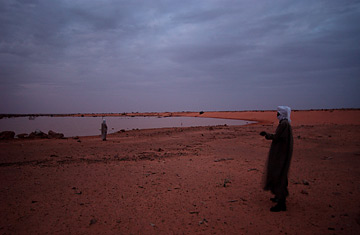
Soldiers with the Sudan Liberation Army, or SLA, camp along the border between Chad and Sudan before venturing further into government-controlled territory in Darfur.
The travel agent had assured me Bishaq was his best driver for my planned journey through the Darfur refugee camps of eastern Chad, but things did not start well. We'd arranged a 5 a.m. start in the hope of crossing the 614 miles of unpaved road to the eastern town of Abeche by nightfall. Bishaq was not only five and a half hours late, but come 5 p.m., as we passed a dust-blown town called Mongo, he suddenly swerved through some metal gates, pulled up in a dusty courtyard, stepped out and ambled away with the word: "Hotel."
The following morning, Bishaq ran down a beautiful black and white speckled wild guinea fowl. He slung it in the back and later, when we reached Abeche, he disappeared for three hours to roast the bird with some cousins, leaving me to amble the streets looking for him.
Over the next week, Bishaq demanded to be fed four times a day — a mini breakfast of tea and pastries, then a bigger, meaty breakfast at 10 a.m., meat for lunch, meat for dinner, and several other breaks for sweet black tea. The fact that we were in an area where people routinely starved did nothing to stem his appetites. If, as happened on occasion, I forced Bishaq to miss a meal, he would complain constantly. "I feel faint, I feel weak," he'd say, holding up a frail hand. "It's not right. It's not good."
Bishaq was also a terrible driver. We hit trees, bushes, berms, several other cars, and even a barn door. He got lost frequently — not a happy situation in the desert, and one he often prolonged by taking most of his directions from pre-schoolers. We also had to backtrack several times to retrieve washing or a suitcase he forgot. And besides the guinea fowl, he squashed a dog, grazed a camel, thwacked a goat, blatted a pigeon and sucked a rare-looking green finch into the grill.
He was a bad driver, but Bishaq was also a truly rotten human being. He enjoyed insulting refugees, whom he claimed were "lazy" and "naughty" and whom he would taunt by slowing down as though to offer a ride, only to refuse when they asked. Once, when a family asked us to take their shaking, malarial father to hospital, I agreed, only to be overruled by Bishaq who insisted the decision was his alone. Another day, I caught Bishaq poking and laughing at a mentally disturbed man.
Obviously, Bishaq didn't like me, either. On our second to last night, he drove 100 miles out of our way to a town called Biltine, persuading me with the promise of a "great hotel with plenty of cold beer," only to disappear once we arrived and leave me to discover that there was, in fact, no hotel in Biltine and I was sleeping in the street.
He chastised me constantly for being in such a hurry. "I've never met someone so busy," he would say. "It's not good. You should never hurry a driver. You should leave timings to God." When I replied that God and I had different deadlines, and that anyway I wasn't a believer, that only confirmed Bishaq's low opinion of me. After that, my every request to speed up or please, please skip just one meal was met by his invoking my "godlessness."
Our mutual antipathy reached a climax on our last night. We had been driving all day and were just two hours outside Ndjamena, where we could finally be rid of each other, when Bishaq pulled off the road in the village of Bokoro, and announced that it was 6 p.m., and company rules stated he could drive no further. The prospect of one more day with Bishaq was more than I could bear: I shouted at him in the street, calling him "thief," "liar" and much, much worse. I demanded he give me the keys, saying I would drive if he was too tired to continue. And, convinced that Bishaq's catalogue of sins were an open and shut case, I sought out the village chief and asked him to adjudicate. I told my story with quiet confidence. Bishaq told his — which seemed to hinge entirely on his statement that he was merely "a simple driver."
I lost. The chief chided me for my flurry and bustle, saying I should learn from the serene and conscientious example set by my driver. As punishment, he ruled I would sleep once again in the road. In a concession to my pleas of being in a hurry, he added Bishaq and I would continue on our way at 4 a.m. Naturally, the next morning Bishaq, who had partied into the wee hours with yet more family and friends, was two hours late. And he grinned all the way to Ndjamena.
